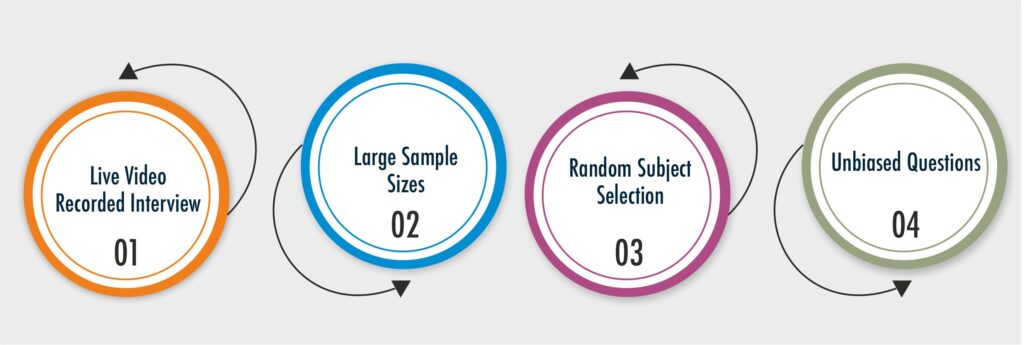BantuPage Polling Methodology

Introduction:
The methodology of polling bellies the accuracy of polling results. It is a statement of fact that the gold standard for polling is conducting live interviews. At BantuPage, we took the gold standard further by conducting our interview under live video or audio recordings and with geo-locating to provide irrevocable proof that our interviews were actually done and eliminate bias. Global best practices dictate that polling organisations are as transparent as they possibly can about the methodology employed during polling.
As a public opinion research firm, BantuPage has the goal of becoming an associate member of the American Association for Public Opinion Research (AAPOR’s) Transparency Initiative. For more information regarding this initiative and polling methodology in general, please visit the website wwww-archive.aapor.org
Standard:

· Live Video Recorded Interview
Our interviews were carried out on the streets of Nigeria covering all the major towns in the 36 States of Nigeria. Informed consent was duly obtained prior to video recordings and in cases where respondents were not willing to be video recorded, we audio recorded their responses to our questions.
· Large Sample Sizes
To ensure that our Survey results eliminated or minimised to a high degree any likely bias and or margins of error that may arise from sampling representation, our sampling consisted of over 3,000 respondents which allows us to forecast the intentions of important subgroups and subsets.
· Random Subject Selection
Subject selection was random. Apart from this being the best way to ensure that every respondent has an equal chance of being selected for our poll, the only inclusion criteria we had was that respondents must have a permanent voter’s card, are accredited to vote, and intend to vote in the upcoming general election.
· Unbiased Questions
As the political landscape is already heated, we ensured that our questions were straightforward, and no candidate was mentioned. It was very important that we also avoided any leading questions or any topical news event whatsoever or acts and omissions that could reflect positively or negatively on any candidate that could influence the opinion of our respondent.
Methodology:
Our polling samples were of randomised Nigerian adults 18 years and older who are registered to vote, who have their PVC and intend to vote. Our Sample sizes across the different subsets consists of over 3,000 respondents which allows us the latitude to draw conclusive inference from every subset
Prior to the commencement of the polling, our interviewers determined likely voters by establishing that they qualify to and intend to vote. To give context, we also established previous voting behaviour particularly, their participation or not at the last presidential election to ascertain whether the respondent has interest in politics or not although previous voting behaviour does not determine future likely voting intentions as personal interests change from time to time.
Our subsets and demographics were weighted to allow for statistical adjustment of our data. Our demographics include Age – which we divided further into subsets such as GenZ, GenX, Millennial and Baby Boomers – Religion, Gender, Ethnicity, Educational background and Employment Status, Marital Status were weighted to reflect and to ensure we obtained full coverage of the target population, but also ensures that subsets within the population are accurately represented within our results.
We selected our respondents randomly. Basically, anyone who met our inclusive criteria and was willing to be interviewed. Randomisation allowed the chance of every demography being included in our polling although we adjusted selection to ensure equal representation of our demography and subsets were uniform.
Our polling days were typically over a 6 day period from 8am to 5pm excluding Sundays and our polling agents limited their polling to within certain numbers of respondents per Local Government Area (LGA) to ensure we cover three-quarters of the LGA in every State.
Our interviews were conducted mostly in English and local parlance “pidgin English” although some were also conducted in the three major languages of Nigeria – Hausa, Yoruba, and Igbo. Where a respondent says s/he does not have a voter card, we did not continue the interview. There were no leading questions about any candidate that could sway the response of the respondent either way. We also ensured that we didn’t mention the acts of commission and/or omissions of any political party whether incumbent or otherwise that may also impact the response of our respondents.
Over 95% of our polls were video recorded with < 5% audio recorded when respondents refuse video recordings. To ensure our polling can stand any rigour to prove our pollsters actually visited these locations, we geo-located all our video and audio recordings using GPS locating Applications and can thus provide evidence to back up our data collection. Our interviewers were all First-Degree holders who were trained by experts on polling and were closely monitored using GPS throughout the polling exercise.
We conducted our polling over 3 months prior to the election – December, January, and February.
It is our utmost belief and trust that our results eliminated every iota of bias that could inadvertently influence the outcome of our result.





